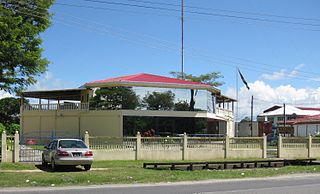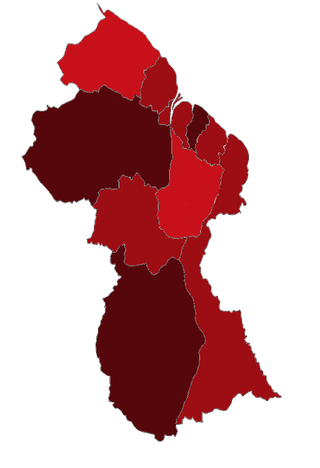Related Research Articles
Guyanese culture reflects the influence of African, Indian, Amerindian, British, Portuguese, Chinese, Creole, and Dutch cultures. Guyana is part of the mainland Caribbean region. Guyanese culture shares a continuum with the cultures of islands in the West Indies.
The music of Guyana encompasses a range of musical styles and genres that draw from various influences including: Indian, Latino-Hispanic, European, African, Chinese, and Amerindian music. Popular Guyanese performers include: Terry Gajraj, Eddy Grant, Dave Martins & the Tradewinds, Aubrey Cummings, Colle´ Kharis and Nicky Porter. The Guyana Music Festival has proven to be influential on the Guyana music scene.

Linden Forbes Sampson Burnham was a Guyanese politician and the leader of the Co-operative Republic of Guyana from 1964 until his death in 1985. He served as Premier of British Guiana from 1964 to 1966, Prime Minister of Guyana from 1964 to 1980 and then as the first Executive President of Guyana from 1980 to 1985. He is often regarded as a strongman who embraced his own version of socialism.
Matthews Ridge is a small village within the Barima-Waini administrative region of Guyana. The village name comes from the name of a public official, Matthew Young, as well as the ridges in the area. The village is divided into three sections, Heaven's Hill, Hell Hill and the valley.
Guyanese literature covers works including novels, poetry, plays and others written by people born or strongly-affiliated with Guyana. Formerly British Guiana, British language and style has an enduring impact on the writings from Guyana, which are done in English language and utilizing Guyanese Creole. Emigration has contributed to a large body of work relating the Guyanese diaspora experience.
Eusi Kwayana, formerly Sydney King, is a Guyanese politician. A cabinet minister in the People's Progressive Party (PPP) government of 1953, he was detained by the British Army in 1954. Later he left the PPP to form ASCRIA, a Pan-Africanist grassroots political group that, after a brief flirtation with the People's National Congress (PNC) of Forbes Burnham, fused into the Working People's Alliance (WPA). Kwayana is also a playwright.

The University of Guyana, in Georgetown, Guyana, is Guyana's national higher education institution. It was established in April 1963 with the following Mission: "To discover, generate, disseminate, and apply knowledge of the highest standard for the service of the community, the nation, and of all mankind within an atmosphere of academic freedom that allows for free and critical enquiry."
The Guyana School of Agriculture (GSA) is a post-secondary college of agricultural education in Guyana, established in 1963 by Dr. Cheddi Jagan. It became a state corporation in 1964. It offers two-year diploma and certificate courses. There are two campuses: The first is at Mon Repos, Demerara, while the other is in Cotton Field Essequibo Coast.

The Cyril Potter College of Education (CPCE) is a higher education institution in Georgetown, Guyana.

The Guyana Defence Force (GDF) is the military of Guyana, established in 1965. It has military bases across the nation. The Commander-in-Chief of the Defence Force is always the incumbent President of Guyana.

David Arthur Granger is a retired military officer who served as the 9th President of Guyana from May 2015 to August 2020. He served for a time as Commander of the Guyana Defence Force and subsequently as National Security Adviser from 1990 to 1992. He was Leader of the Opposition in the National Assembly of Guyana from 2012 to 2015.
Prostitution in Guyana is illegal but widespread. Prostitution law is antiquated and dates from the colonial era. Law enforcement is inconsistent and sex workers report violence and abuse by the police. Many turn to prostitution for economic reasons and the lack of other job opportunities. Prostitution continues to receive greater public attention due to the high incidence of HIV/AIDS among prostitutes. Prostitution in the country is separated into three types: "uptown", servicing affluent clients, "downtown", servicing the working classes, and mining sites. UNAIDS estimate there to be 6,000 prostitutes in the country.
Sophia is a ward of Georgetown, the capital of Guyana. It's a predominantly Afro-Guyanese community, and one of Georgetown's poorest neighborhoods.

The National Archives of Guyana is the legal depository for official records and local newspaper publications in Guyana. Established in 1958, the National Archives are situated in D'Urban Park on Homestretch Avenue in Central Georgetown. In 1972 it was made a department of the Ministry of Culture, Youth and Sport in the Government of Guyana.

Women in Guyana are a cross-section of Guyanese society whose numbers have fluctuated with time. A country with primarily Indo-Guyanese, Afro-Guyanese and Amerindian women, Guyana has also been home to women of European or Chinese descent. The country has had a female president, Janet Jagan. Although it is part of South America, Guyana is culturally and historically aligned with the Commonwealth Caribbean and is often compared to Trinidad and Tobago.
Karen de Souza is a Guyanese women and child's rights activist who has worked to advocate for victims, educate and provide support for victims of violence. Founder of the NGO Red Thread anti-violence campaigns, she has been involved in training programmes of judicial officers and contributed to the drafting law to protect trafficking and anti-violence. Her advocacy has been recognized by both regional and international organizations.

The COVID-19 pandemic in Guyana is part of the worldwide pandemic of coronavirus disease 2019 caused by severe acute respiratory syndrome coronavirus 2. The virus was confirmed to have reached Guyana on 11 March 2020. The first case was a woman who travelled from New York, a 52-year-old woman with underlying health conditions, including diabetes and hypertension. The woman died at the Georgetown Public Hospital.
The Carnegie School of Home Economics (CSHE) is a service-sector trade school in Guyana.

Yvonne Fredericks-Pearson is a Guyanese politician. She has been a member of the National Assembly since 2015. She served as Toshao of Mainstay/Whyaka from 1994 to 2012.

Aubrey Norton is a Guyanese politician serving as Leader of the Opposition and as a member of the National Assembly since April 2022.
References
- 1 2 "The Guyana National Service". 10 December 2008.
- 1 2 "The Guyana National Service". Kaieteur News. 2012-01-29. Retrieved 2021-01-14.
- ↑ Path to Freedom: My Story of Perseverance, Page 168, Conrad Taylor - 2011.
- ↑ "Society...Reincarnating the Guyana National Service". Stabroek News. 2017-05-25. Retrieved 2021-01-14.
- ↑ "National Service Reunion…Granger urges ex-members to look to future for youth development". Kaieteur News. 2015-08-28. Retrieved 2021-01-14.